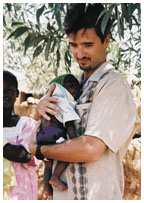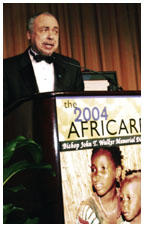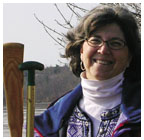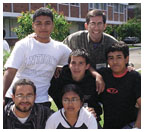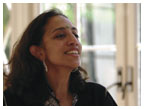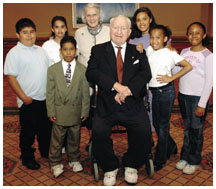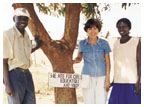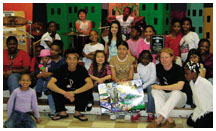June 8, 2005: Features
Have an opinion about this issue of PAW? Please take a minute to click here and fill out our online survey. It’s an easy way to let the editors know what you like and dislike, and how you think PAW might do better. (All responses will be anonymous.) |
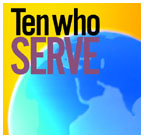
Interviews by PAW contributor Maria LoBiondo
Every Princetonian knows the University’s informal motto — Princeton in the nation’s service, and in the service of all nations. Here are 10 alumni who truly have taken it to heart. They work in classrooms, agricultural fields, shelters, and churches; in American cities and around the world. Most labor in small organizations, and few are well known. But their projects and commitment represent the range of public service undertaken in ways large and small by Princetonians each day. In this Commencement season, they offer inspiration and advice to new alumni — including the sentiment that a life’s education begins, in large part, after the walk through FitzRandolph Gate.
(Courtesy John Scicchitano ’93) |
John Scicchitano ’93
John Scicchitano ’93 first went to Africa a decade ago as a volunteer, working to bring clean water to a community. Today he is regional adviser for West and North Africa in the Office of Foreign Disaster Assistance of USAID, a government agency, and spends his time assessing disasters — both natural and man-made.
When I knew I was on the right track:
I remember seeing a man named Dayamba, a blacksmith in the village of Piela, Burkino Faso. He learned how to maintain and repair [water] pumps. His first experience of water coming forth, his joy at what he was able to do, and the villagers’, too — for me, the satisfaction was to know I had helped bring a little piece of progress to a small village.
What keeps me going:
It’s easy to be motivated when your work is directly related to human needs and there’s plenty of good work to be done.
Biggest surprise:
The joy of working with people in such grave need. When you see images on TV or read about Africa, it seems like such a desperate place. There is suffering, and death is something faced in Africa differently than in the U.S. But there’s a sense of real joy, strong families, and community. [People] live day-to-day and seek to improve their lives while not bemoaning what they lack.
What I didn’t know at Princeton:
What wealth and poverty really mean. In a place like Princeton, those are terms that challenge us, especially those of us who come from less affluent backgrounds, who feel overwhelmed by the wealth at Princeton. But having lived in Africa for 10 years, I have a different sense of what wealth and poverty mean in a global perspective. So many of my definitions have changed — on religion, race, gender, of community and family and environment. For example, I’ve lived in Burkino Faso for four years. Every morning my neighbors and I greet each other as we go off. We always know when someone is ill, or there’s been a birth, or someone is traveling. If someone is ill, there’s an automatic response to contribute to that person’s well-being — neighbors, friends, beyond family. Community becomes a broader term than in the U.S. and carries a greater sense of obligation.
Advice to new grads:
Take time to serve before you are preoccupied with the race of beginning a career and moving up in the world. Look hard into what you think you can give, but also be ready to be transformed by people in need.
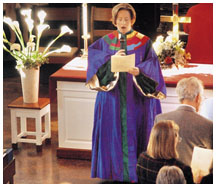 |
Jane Field *87
Though Jane Field *87’s “day job” is running youth programs at two churches, she also is a community educator at the Domestic Violence Crisis Center in Stamford, Conn. There, Field, an ordained Presbyterian clergy member, provides youth programs in anger management, conflict resolution, and dating and family violence.
When I knew I was on the right track:
I did a dating-violence workshop in a middle school, and I noticed that [afterward] there was a girl talking with her teacher. The teacher came over to me and said, “She needs to talk to you.” The girl had spent the weekend locked in her room with her 2-year-old brother because her dad was beating her mom. We were able to bring the mom and her kids to a shelter that night. And even now they’re in a safe place.
What keeps me going:
Partly it’s my faith. I have a very strong conviction that we’re called to work for justice and help the oppressed. At Princeton, my field placement was to do long-range planning at a shelter in Trenton, and I became very passionate about domestic violence issues.
Biggest surprise:
That I love middle-school-age kids.
What I didn’t know at Princeton:
Everything! There’s a lot going on with people that you’d never imagine. You could meet someone who’s a victim of domestic violence and never know it from talking with them. There’s always a lot more going on than we know — a job loss, a parent ill. When I was a student, I couldn’t imagine that.
Advice for new grads:
Don’t assume your life will be happy or purposeful based on your salary. Use your gifts to make the world a better place, help people, or bring beauty into the world, not just to accumulate stuff or get a fat bank account. That’s missing the point of why we’re here.
 |
Marty Johnson ’81
Marty Johnson ’81, far right, with Tamar Wooten, a construction site trainer, left, and a trainee from an Isles program. (courtesy isles, inc.)Marty Johnson ’81 founded Isles, a Trenton-based community organization, while a senior at Princeton and remains as its president. The organization’s programs are in community planning, housing development and home ownership, training and education, and self-sufficiency — even growing food on vacant urban plots. The goal: Give people tools for their own well-being.
What keeps me going:
First, a sense that we can have an impact on the world. Second, I’ve had the great fortune of creating an organization and surrounding myself with people I want to be with, a diverse, strong group of volunteers, friends, and workers. It’s also out of self-interest. There are a number of ways of being compensated in work — money is just one.
Biggest surprise:
How the nonprofit sector has grown so fast over the last 20 years. It’s very exciting to be an entrepreneurial group trying to deal with public issues.
What I didn’t know at Princeton:
I know in a deeper and substantial way that change starts from within.
At Princeton I was more certain of myself and more critical of the external world. Over time you learn you have to be balanced, not view people as victims or perpetrators. As a student I was high on energy and low on balance.
Advice to new grads:
The most important for me is what [writer and lecturer] Joseph Campbell said: “Follow your bliss.” Don’t follow others’ assumptions about what you can do. A Princeton education is a powerful sword. The beauty is that you think you can do anything. The back side is the danger that comes with thinking you can do anything. There’s a responsibility leaders bring with them in their roles.
(Courtesy Africare) |
Julius Coles *66
Julius Coles *66 is president of Africare, a private agency that is providing economic assistance to 25 countries in Africa. Among other activities, the organization helps people grow their own food, provides treatment and counseling to those with AIDS, and helps provide clean water systems.
What keeps me going:
We’re able to raise money to help Africans help themselves. We have the opportunity to improve the quality of life for African people.
Biggest surprise:
The number of African countries that want us to work with them. Now we’re working in about half.
What I didn’t know at Princeton:
It’s a big world out there, very complicated. I had to adjust my sights to take into account what was possible and achievable because the problems are so vast.
Advice to new grads:
You’ve got one of the best educations in the world; now take that education and do service to the people of the world. We are part of a world community.
(Courtesy Naomi Schalit ’79) |
Naomi Schalit ’79
Before she became executive director of Maine Rivers, a statewide advocacy organization that works to protect — of course — Maine’s rivers, Naomi Schalit ’79 was a journalist.
What I do all day:
I fight, yell, scream, bite my tongue — I spend a lot of time in the State House and not enough time on the rivers. I stop by the Kennebunk River to see if eagles or mergansers are there. I check the budget to see if I can pay me — the only staff — or if I have to beg for more [money]. I go to meetings. Tonight I’ll go to a meeting on the reconstruction of a dam we don’t want reconstructed.
When I knew I was on the right track:
As an investigative reporter, I had done a series of hard-hitting stories on fertilizer that was actually hazardous waste. I knew I was on the right track when Ironite [the fertilizer producer] threatened to sue me. The day [Ironite] was taken off the store shelves I got messages from people in the state environmental protection office, congratulating me — and I knew I could have a real effect here.
What keeps me going:
My sense of outrage — and a love for the world. Each morning I ask, “What’s the outrage of the day?” I really don’t like it when people don’t act in the public interest, when they lie or cheat. I care deeply about the truth.
Biggest surprise:
The dedication of people who have been in this far longer than I have. My goals used to be more weighted toward doing good things. Now, with the political situation, I measure by how many bad things I stop.
Advice to new grads:
Read Marge Piercy’s poem, “To Be of Use.” A line of it is: “The work of the world is common as mud.” What keeps me going every day is the work of the world.
(Courtesy Edgardo Lopez ’90) |
Edgardo Lopez ’90
Edgardo López ’90, top, right, at a youth leadership workshop.
Edgardo López ’90 worked as an architect before becoming a Marist brother and missionary. Now he works with young people in Central America: harvesting crops with the Quiché Indians in Guatemala, working with at-risk youth outside Guatemala City, and, most recently, teaching and leading pastoral care at a private Catholic secondary school.
When I knew I was on the right track:
I invited three [at-risk teenagers] to a leadership workshop. These three kids were about 17; they had a lot of difficulty relating outside their usual environment. It was a risk for me and very difficult for them. They didn’t know how to follow a time schedule. They had difficulty eating with a knife and fork. The other kids were kind to them, and tried to talk about Spanish football, but these kids don’t have a TV — so how could they respond? At the end of nine days together, they had established bonds with the other youngsters that go beyond their culture, go beyond where they come from. I could feel that they opened up to other realities. We sat on the grass for an hour and a half to chat and they expressed what they had learned — and it was worth it.
Biggest surprise:
I thought I’d be designing buildings and have a family, but this is what I dreamed of inside me. I had to give things up, but I am so happy doing this.
What I didn’t know at Princeton:
How much suffering there was in the world.
Advice to new grads:
See the world, and you can do that even in your own community — but not as a tourist, because a tourist is detached. Go as a companion, someone who gets to know how that other culture — that other community — lives.
(Courtesy Global Fund for Women) |
Kavita Ramdas *88
Kavita Ramdas *88 heads the Global Fund for Women, a grant-making foundation focused exclusively on women’s rights. The foundation funds projects in 160 countries.
What keeps me going:
The courage of the women I meet in different parts of the world who refuse to accept injustice. And my daughter and my husband, who say men won’t be free until women are. ... Mostly, seeing the possibility of what can happen when women are given the opportunity to participate fully and equally in all aspects of their society.
Biggest surprise:
I have been saddened at how much resistance there is [to the idea] that women’s equality is beneficial. There’s a lot of lip service. ... I’m saddened by the oppression that haunts women’s lives. Every year 600,000 women die because of complications in childbirth and abortions, but there is no tsunami-like response. In war, when you say “collateral damage,” you’re talking about women and children.
What I didn’t know at Princeton:
There are so many more issues in the United States than we realized at Princeton. It’s easier to be in international development than to acknowledge that in Chicago children are dying because they didn’t have measles vaccinations. That was a real wake-up call.
Advice to new grads:
Keep an open mind. Be willing to accept that all the experiences you have are opportunities to grow. Having a Princeton education is an incredible privilege. It requires you to give back something — it’s not an entitlement.
(Courtesy Colorado I have a dream foundation/pro-motion, ltd. ) |
Jerome McHugh ’51
Though disabled by a stroke, Jerome P. McHugh ’51 has become a caring friend to 53 third- and fourth-graders in a low-income school in Denver, Colo. McHugh and his wife, Anabel, adopted the students through the I Have A Dream Foundation, and — if the students graduate from high school — the McHughs will help pay their college and vocational school tuition bills. Along the way, the McHughs get to know the children and their families and help provide mentoring, cultural trips, and other experiences.
What keeps me going:
You just see these young people and what wonderful potential is available. [It’s not] cherry-picking, but taking the whole class. Critics can say we only help a few — it’s true — but these young children know we’re there for them.
Biggest surprise:
The wonderful reception that the parents give. It shouldn’t surprise me, but they have a great thankfulness, they don’t take it for granted, and they’re very aware of the opportunity their children have.
Advice to new grads:
Giving to the community is very fulfilling to the individual — I know it sounds trite, but there’s no better way to put it. Don’t look for accolades: Just do it and be quiet about it.
(Courtesy Cathy Watson ’78) |
Cathy Watson ’78
Cathy Watson ’78 is the founder and co-director of the Straight Talk Foundation in Uganda, which publishes newsletters and produces radio shows on adolescent reproductive health issues. The group “looks for reasons why kids put themselves sexually at risk,” and works to help keep them safe.
What keeps me going:
The letters we get from the kids — 40,000 a year! They ask questions, send photographs, and say we’ve made a real difference in their lives. We also hear from parents and teachers. We feel we’re on the cutting edge of messaging about the AIDS epidemic. We get to see what people’s lives are really like. We get inside the dilemmas they face in difficult circumstances.
Biggest surprise:
I’ve learned I’m not a bad leader and I’ve got a lot of vision. And it surprises me that I never get bored.
What I didn’t know at Princeton:
I didn’t know where to insert myself to have a real impact. [Since then] I’ve learned that simple, clear information can make a difference in people’s lives.
Advice to new grads:
Strike out and build institutions of your own. If you have a vision, go for it. Don’t worry too much about money yet. There’s so much to learn, and you can only learn by doing.
Christoph Geiseler ’04, second from right in the front row, with music-loving students. (Courtesy Christoph Geiseler ’04) |
Christoph Geiseler ’04
Christoph Geiseler ’04’s nonprofit organization, MimA Music, stemmed from his senior thesis. The organization gets college jazz musicians to provide free music lessons to low-income children. Geiseler is developing after-school programs and a musicians’ network, and convincing donors to contribute instruments.
What keeps me going:
The idea of being able to give to other people the joy of working in an environment where art is the main focus. It’s all about creativity and self-expression.
What I didn’t know at Princeton:
I’ve learned how important personal communication, politeness, and courtesy are when communicating with people you don’t know.
Advice to new grads:
If you’re passionate about an idea, you’ll undoubtedly find
others who are as enthusiastic as you are. ![]()


